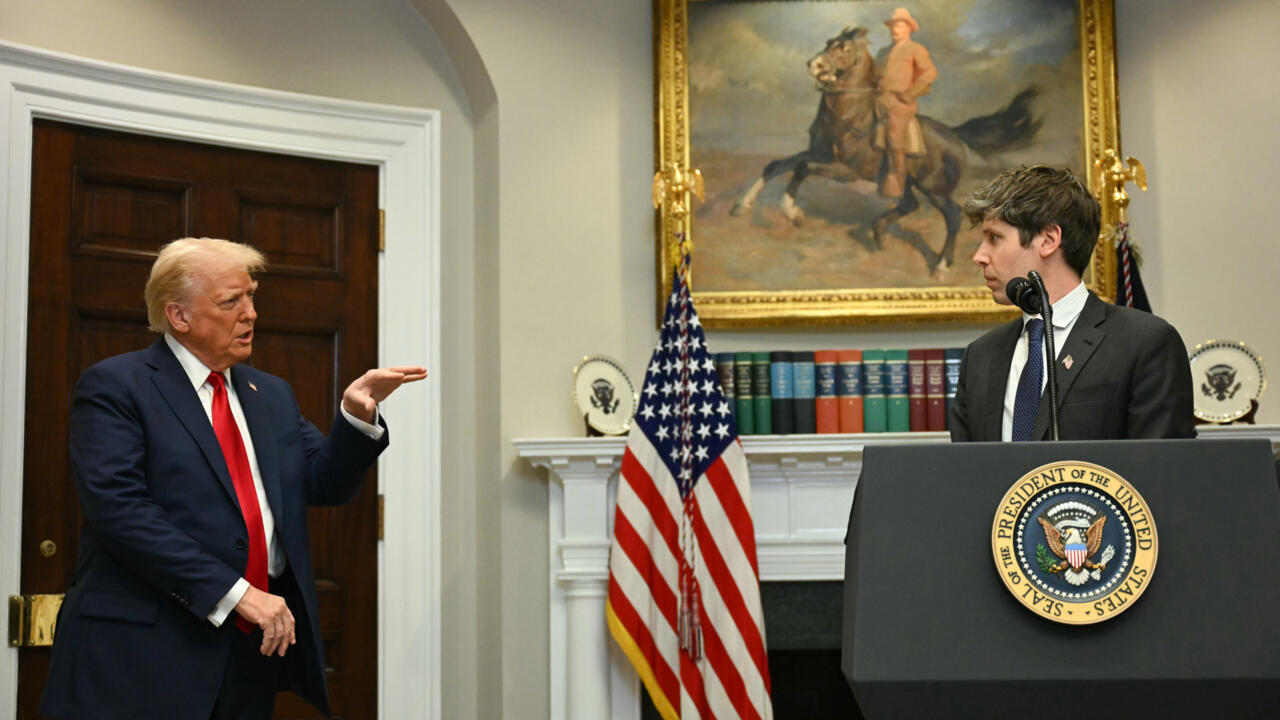Big Tech Presses for AI Deregulation Under Trump
Washington (AFP) – Major technology companies are lobbying the Trump administration to loosen restrictions on artificial intelligence development, claiming that this is the only way for the United States to maintain its competitive edge and rival China.

US President Trump gestures as OpenAI CEO Sam Altman speaks at the White House in January.
Spurred by the sudden advancements in generative AI, governments worldwide initially moved to establish safety measures. Simultaneously, major tech corporations rapidly integrated this technology into their products. Since taking office in January, the Trump administration has focused on accelerating AI development. This shift comes despite concerns about AI models producing inaccurate outputs, creating deepfakes, or causing job losses.
“The AI future is not going to be won by hand-wringing about safety,” stated Vice President JD Vance during a recent AI summit in Paris. This message created unease among international partners, especially in Europe, where the EU AI Act was designed as a standard for managing the technology.
However, with the shift in America’s approach, European officials are adjusting their focus towards investment and innovation over safety, according to expert analysis.
“We’re going to see a significant pullback in terms of the regulatory efforts… worldwide,” explained David Danks, a professor of data science and philosophy at the University of California San Diego. “That certainly has been signaled here in the United States, but we’re also seeing it in Europe.”
Industry Seeks Regulatory Retreat
Tech companies are taking advantage of this change, seeking the freedom to develop AI technologies they claim were excessively constrained under the Biden administration. One of Trump’s initial executive actions involved dismantling Biden’s policies, which had suggested modest safety measures for powerful AI models and directed agencies to oversee these changes.
“It’s clear that we’re taking a step back from that idea that there’s going to be a coherent overall approach to AI regulation,” noted Karen Silverman, CEO of the AI advisory firm Cantellus Group.
The Trump administration has asked industry leaders to share their vision for policy, emphasizing that the US must maintain its position as the “undeniable leader in AI technology” with minimal constraints on investors. The industry submissions will shape the White House’s AI action plan, anticipated later this summer.
The responses from major players have been predictable, with the main theme being that China poses an existential threat that can only be addressed by providing companies with an open path, free of regulation.
OpenAI’s submission contrasts pointedly with China, highlighting DeepSeek, a Chinese-developed generative AI model developed at a fraction of the costs of American development. This example is used to underscore the competitive threat.
OpenAI contends that American AI development should be “protected from both autocratic powers that would take people’s freedoms away, and layers of laws and bureaucracy that would prevent our realizing them.”
For AI analyst Zvi Mowshowitz, OpenAI’s “goal is to have the federal government not only not regulate AI” but also prevent individual US states from doing so. OpenAI, currently in litigation with the New York Times over the use of its content for training, also argues that any restriction on access to online data would concede the AI race to China.
“Without fair use access to copyrighted material…America loses, as does the success of democratic AI,” according to OpenAI.
Another response, submitted by a group of Hollywood celebrities including Ben Stiller and Cynthia Erivo, rejects this position, reflecting the film and television industry’s challenging relationship with the technology.
Meta and Google Weigh In
In its response, Meta promoted its open-source Llama AI model as part of the fight for American technological dominance.
“Open-source models are essential for the US to win the AI race against China and ensure American AI dominance,” the company stated. CEO Mark Zuckerberg has even supported retaliatory tariffs against European regulatory efforts.
Google’s input focused on infrastructure investment to support AI’s significant energy needs. Like its peers, Google opposes state-by-state regulations in the US, saying they would undermine America’s technological leadership.
Despite the push for minimal oversight, industry observers caution that generative AI carries inherent risks, with or without government regulation.
“Bad press is universal, and if your technology leads to really bad outcomes, you’re going to get raked over the public relations coals,” warned Danks.
Companies must take steps to mitigate these dangers, he added.


